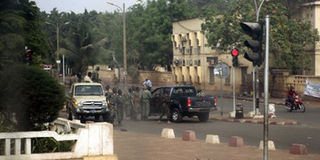Breaking News: Old Kijabe dam tragedy: Death toll rises to 45
Returning Tuareg fighters from Libya fuelled Mali coup, says UN

Photo/AFP
Malian soldiers gather on a street of Bamako on March 21, 2012.
NEW YORK, Friday
Last year’s Nato-assisted overthrow of the Libyan regime is a factor in this week’s military takeover in Mali, the United Nations’ chief political officer said on Thursday.
“Well, of course, there is a relationship,” UN Under-Secretary General for Political Affairs B Lynn Pascoe said following a Security Council meeting on the coup in Mali.
Mr Pascoe explained that “much more firepower and drive” were added to a simmering rebellion in northern Mali by up to 2,000 Tuareg fighters who had been employed in Libya until the ouster of Muammar Gaddafi in October.
The Tuaregs, some of whom held high ranks in the Libyan army, then returned to Mali with their weapons, Mr Pascoe said.
Malian military officers who overthrew President Amadou Toumani Toure cited as a key grievance the government’s inadequate support for army operations against the strengthened Tuareg insurgents.
The coup in Mali can thus be seen as an example of “blowback” — an unintended and negative consequence of the overthrow of Libya’s dictatorship. (READ: Mali soldiers say they have seized power)
Nato’s intervention against the Gaddafi regime, a decisive factor in its overthrow, had been opposed by the African Union.
The United States, which played a key role in the Libya operation, had often cited Mali as a beacon of democracy in Africa.
The US has given Mali a five-year Millennium Challenge grant of $460 million for development projects in the country.
The African Union, the UN Security Council and the United States have all condemned the coup in Mali and urged restoration of the elected government. (READ: Africans must unite against the Mali coup)
Ms Pascoe said Thursday that the UN had significant concerns about the situation in Mali.
The National Committee for Redressment of Democracy and Restoration of the State (CNRDR) carried out the coup, toppling Malian President Amadou Toumani Toure and announcing on Thursday morning that they had officially taken control over the West African country.
“We also believe its very important that there be no violence and that this be resolved very quickly,” said Pascoe.
According to Pascoe, Said Djinnit — special representative of the UN secretary-general and head of the UN Office in West Africa, who was in Bamako days before the coup — is engaged in handling the situation.
“Right now he is working closely with ECOWAS (Economic Community of West African States) and the African Union and I think we will probably be seeing some efforts again as we have done before in West Africa among the three, to see what we can do to resolve these issues quickly,” Pascoe said.
Pascoe said the UN is concerned that the coup “could actually cause great difficulties against the effort in the north.”




